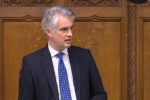
James Cartlidge: The triple lock. The NHS. The aid budget. If there’s to be a snap election, we’ll need a new manifesto.
Iain Dale is right – the Prime Minister should “immediately table a one-line Bill to trigger Article 50 by next March, and put it to a vote immediately”. This is the only credible way forward for Parliament, following last week’s ruling in the High Court. I campaigned for Remain, but can see no logical or democratically moral alternative to voting to support such a Bill on Second Reading. The Government should ditch the appeal and be done with. If we run into turbulence at later stages or in the Lords, a general election will then be inevitable.
Yet, to this increasingly plausible prospect we must add one profound question that so far seems to have been neglected. In the event of an early election, what precisely are we going to put in our manifesto? What are we going to say on those juggernaut issues – the triple lock on the state pension; the NHS; most importantly, the deficit?
First, the immediate concern. I may be wrong, but I suspect that a lot of what I would call ‘moderately Eurosceptic’ Remain-backing Conservative MPs accept the referendum result as decisive and incontrovertible, and would not consider supporting any ruse designed to reverse it. A minority may be so set on securing a ‘softer’ Brexit that they dally with delay when presented with tantalising amendments. But surely we can all see that the decision to stay or go has been resolved and, furthermore, that the detailed terms cannot be agreed unilaterally, no matter how many more hours are expanded in permanent Parliamentary purgatory. Sorry to state the obvious – but we are reliant on the agreement of 27 other nations.
In the cold light of day that trickles through the curtains after issuing Article 50, our future arrangements with the EU post-Brexit will be subject to turgid and endless negotiation. Forcing detailed debate in a legislative context only threatens to ‘show our hand’ pre-negotiation. Attempting to tease out ‘transparency’ by lengthening any Article 50 Bill-making will result – at best – in a meaningless set of negotiating principles that would in all likelihood bear no relation to the final deal. Hence, I would say for better or worse, richer or poorer, we should get on with matters, and avoid the one outcome that is infinitely less preferable to Leave or Remain: limbo.
Yet pressing ahead in this way clearly runs the risk of Parliamentary paralysis. Assuming that the appeal against the High Court decision is lost or not moved, and that the Government brings forward the short Bill so many of us want to see, the Second Reading in the Commons may be negotiated with a significant majority, but what thereafter? As many have said, in the event of legislative lockdown with the Lords over Article 50, the probability of an imminent general election looms large. Which moves us to the other question I raise: if Theresa May is forced to go the country, what will be the platform for our pitch to the electorate? I would argue that if we really think an election could be on the cards within months, the matter of what we promise voters needs serious discussion right now.
Those for whom leaving the EU is an end in itself they may be quite happy to have a short, sharp manifesto that amounts to 2015′s, version two: ‘We will issue Article 50 pronto – for all other matters see the previous document’. However, we can be quite sure that the country at large wants to see that our thinking has moved on since last year on may important matters - from the NHS to the cost of putting a roof over one’s head.
The biggest questions arise over those thorny issues parked till 2020 and untouchable because they are ‘manifesto commitments’. For example, during the 1922 committee’s leadership hustings I asked both final round candidates whether, given the huge challenges facing young people (e.g. getting on the the housing ladder), it was morally defensible to continue to protect pensioner benefits? Both Andrea Leadsom and Theresa May replied that we had made a manifesto commitment in that regard and would stick by it.
Fine – but what happens if in a few months a new manifesto has to be published? Iain Duncan Smith has rightly, in my view, rightly raised the sheer gaping cost of the triple lock, imposing an ever great burden on a generation of workers unlikely to benefit from the same relative generosity. We cannot hide behind old manifesto commitments when harsh economic reality is staring us in the face and we have to write new ones.
What about the sustainability of the NHS? Are we really going to keep on going without any attempt at reforming the way we fund care when budgetary pressures grow year on year? We had a manifesto pledge on international aid – yet another ‘protected’ budget’ – but will we continue to spend so much on aid when we have a vast current account deficit that suggests we are borrowing the money from abroad to philanthropically send back again?
Let us not forget that we may have made manifesto pledges sacrosanct – but only for spending, not saving. We have ditched our 2015 manifesto pledge to abolish the deficit by 2018. We have no idea what will replace it, only that we are no longer tough on the deficit, and we have given up altogether being tough on the causes of our deficit. Without batting an eyelid we drop commitments to prudence, but not to the unsustainable departmental protections that generate ever higher borrowing in the first place.
The NHS; the state pension; welfare reform; aid. In truth, policy on all these is as much in limbo as our Brexit settlement, long-term reform sacrificed to a set of politically driven departmental spending protections and manifesto guarantees. In a new manifesto, could we really maintain that limbo till 2022? Not one of these areas requires Brexit for us to have the power to do something radical. We already have the political power. What we require is the political will and, ideally, a mandate.
We could and should bring forward a one line bill to issue Article 50. A new manifesto would need to be slightly longer.
Published by Conservative Home website.



